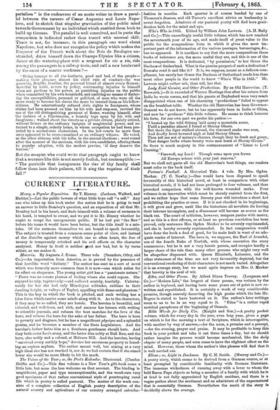Macaria. By Augusta J. Evans. Three vols. (Saunders, Otley, and
Co.)—An importation from America, as is proved by the presence of that horrible word "dubiety." The author has sent us a sort of novel which was formerly more common than it is now—one which relies for its effect on eloquence. The young artist girl has a "passionate nature."
There was no :Lorene plateau of feeling where she could repose. She enjoyed ke3nly, rapturously—and suffered acutely, fearfully. Unfortu- nately for her she had only Himalayan solitudes, sublime in their dazzling height, or valleys of Tophet, appalling with flame and phantom." This is the key in which the book is pitched, and such writing has a false force which carries some minds along with it. As to the characters, if they may be so called, they are heroic. The heroine is beautiful, and talented, and well-born, and rich, and amuses her leisure with writing to scientific journals, and refuses the beet matches for the love of the hero, and refuses the hero for the sake of her father. The hero is born to poverty and disgrace, but he has a magnificent physique and a splendid genius, and he becomes a member of the State Legislature. And the heroine's father hates him as a Southern gentleman should hate. And they both enter Lee's army, and the latter dies nobly at Bull Run, and the hero, also nobly and a colonel, at Malvern Hill. And the heroine, having "survived every earthly hope," devotes her enormous property to found- ing an orphan asylum. The author meant well, but aiming at a very high ideal she has not reached it, nor do we feel certain that if she aimed lower she would be more likely to hit the mark.






























 Previous page
Previous page